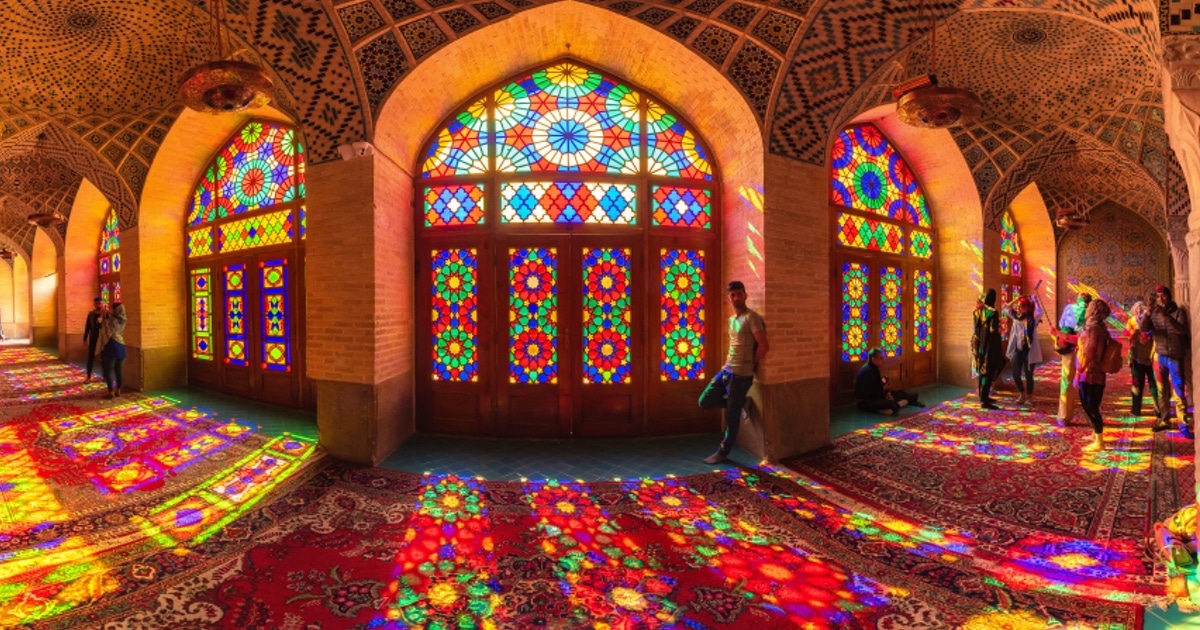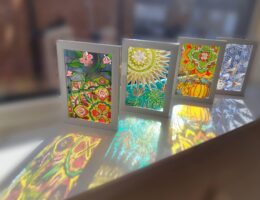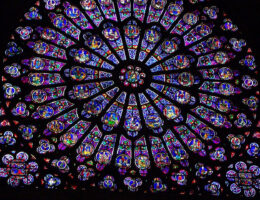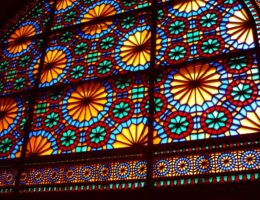IRAN ART EXHIBITION: SEE HOW STAINED GLASS ART EMBELLISH THESE FAMOUS PLACES
Stained glass has enhanced buildings since the Middle Ages and continues to captivate architects and design lovers today. Used as windows or ceilings, the works, which are constructed of colored glass pieces connected and outlined by strips of lead, are frequently found in religious buildings, such as cathedrals and mosques, although they also became popular for secular spaces beginning in the 19th century and now adorn private homes, hotels, cultural buildings, and department stores. From a Gothic chapel in Paris to a hotel in Mexico City, take a look at some of the most beautiful stained-glass windows in the world and see how architects such as Philip Johnson, Oscar Niemeyer, and Antoni Gaudí have used the art form in some of their most iconic designs.
• Cathedral of Brasília, Brazil
• The Oscar Niemeyer–designed cathedral’s distinctive stained glass was created by artist Marianne Peretti in 1990. The 22,000- square-foot work features waves of blue, green, white, and brown glass.
• Aachen Cathedral, Germany
• Construction of the UNESCO World Heritage Site began in 796 under Emperor Charlemagne and was expanded during the Middle Ages. The gothic sanctuary is lined with nearly 84-foot-tall stained-glass windows, designed by Walther Benner and Anton Wendling after the original glazing was destroyed during World War II.
• St. Joseph’s Church, Le Havre, France
• The Neo-Gothic church was built in the 1950s in the French port city as a tribute to the 5,000 citizens who died during World War II, when the town was nearly completely destroyed. Architect Auguste Perret was instrumental in the plan to rebuild the city and designed the church, which features a 350-foot spire lined with stained glass.
• Sainte-Chapelle, Paris
• Commissioned in the 13th century by King Louis IX, this Gothic chapel is nestled on the Ile de la Cité and boasts 15 stained-glass panels in its nave and apse that depict more than a thousand biblical figures. The panels recently underwent a seven-year, $10 million restoration, during which the windows were removed and cleaned with lasers.
• Thanks-Giving Square, Dallas, Texas
• In 1977 Philip Johnson designed a delicately spiraling white chapel to anchor a tranquil three-acre oasis in the heart of downtown Dallas. The ornate structure is crowned by the Glory Window, which comprises 73 stained-glass panels crafted by French artist Gabriel Loire.
• Metropolitan Cathedral of St. Sebastian, Rio de Janeiro
• IRAN ART EXHIBITION: Adding warmth to an otherwise austere religious site, four rectilinear stained-glass windows stretch some 200 feet to the ceiling of this beehive-shaped cathedral, which was completed in 1976. As many as 20,000 people can fill the Edgar Fonseca–designed church, which holds the Museu de Arte Sacra in its subterranean space.
• Chicago Cultural Center, Chicago
• The Louis Comfort Tiffany dome at the Chicago Cultural Center measures 38 feet in diameter, making it one of the largest stained-glass domes in the world. Held together by an ornate cast-iron frame that features some 30,000 pieces of glass shaped like fish scales, the dome was finished in 1897, the same year the building opened as the city’s first public library. The dome underwent a meticulous restoration in 2008 and is now lighted electrically.
• Nasir al-Mulk Mosque, Shiraz, Iran
• Finished at the end of the 19th century, this Technicolor mosque in southern Iran dazzles with intricate stained-glass windows, richly colored tiles, carved pillars, and woven rugs. Due to its strategic positioning, early-morning light produces a kaleidoscopic effect within the structure, which has survived numerous earthquakes thanks to the flexible wood struts within its walls.
• King’s College Chapel, Cambridge, England
• In 1446 King Henry VI laid the foundation stone of this monumental English Gothic chapel, which features the largest fan vault in the world. The 26 stained-glass panels were installed more than a century later under the authority of King Henry VIII, who used them to reinforce his position as Supreme Head of the English Church after breaking with Rome.
• La Sagrada Familia, Barcelona
• Perhaps the most iconic work of architect Antoni Gaudí, this Catalan Modernisme cathedral that dominates the Barcelona skyline contains a stunning rainbow of abstract stained-glass windows. Although work began on the structure in 1882, Gaudí never saw the windows installed but left several directives as to his wishes for them. Still incomplete, the building is now helmed by architect Jordi Faulí, who recently announced that the final stage of construction is on track to be complete in 2026, exactly a century after Gaudí’s death.
• Gran Hotel Ciudad de México, Mexico City
• This 1899 upmarket department store with a soaring Tiffany-stained-glass ceiling in the lobby was transformed into a luxury hotel in anticipation of the 1968 Olympic Games. The ceiling, which evokes the country’s Mesoamerican heritage with a lively palette of turquoise and gold, was designed by French artisan Jacques Gruber and also features a Louis XV–style chandelier.
• Galeries Lafayette, Paris
• One of the city’s most popular shopping destinations, this luxury bazaar in the 9th arrondissement was completed in 1912. Perhaps its most iconic feature is the 141-foot-tall neo-Byzantine dome, which was designed by French glassmaker Jacques Gruber to channel golden light onto the shoppers below, who now reportedly spend over $1.5 billion annually at the fashion emporium.
• National Gallery of Victoria, Melbourne, Australia
• Commissioned by the Australian government, this vast art gallery planned by architect Roy Grounds opened its doors in August 1968. At the time, the Great Hall’s soaring stained-glass ceiling, installed over a five-year period by Australian artist Leonard French, was the largest in the world and includes panes imported from Belgium and France.
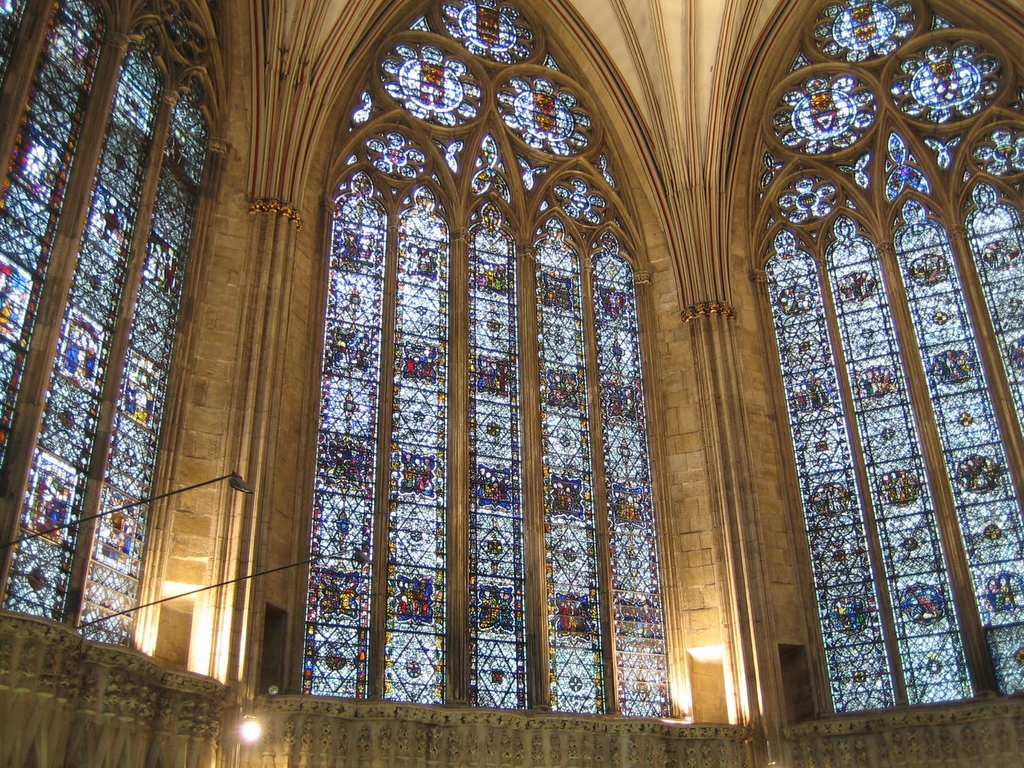
• York Minster Chapter House, York, England
• IRAN ART EXHIBITION: The Chapter House at one of northern Europe’s largest Gothic cathedrals contains a striking collection of medieval stained glass, including windows with some of the earliest recorded depictions of architecture. Glazed in the late 13th century, the geometric glasswork features a scene of the martyrdom of Thomas Becket under an ecclesiastical canopy, plus several full-length figures within a canopied niche.
• Palau de la Música Catalana, Barcelona
• Completed by Catalan Art Nouveau architect Lluís Domènech i Montaner in 1908, this steel-framed concert hall boasts a stained-glass skylight featuring a three-dimensional depiction of the sun. Named a UNESCO World Heritage Site in 1997, the music hall contains countless other artworks, including the busts of Anselm Clavé and Beethoven that flank the stage.
• Basilica della Santissima Annunziata del Vastato, Genoa, Italy
• While commissioning artists to work on the structure, the lavish Basilica della Santissima Annunziata del Vastato in Genoa employed some of the major baroque artists of the 17th century. The church was badly damaged by Allied bombings during World War II, and had to be restored.
• Melk Abbey, Austria
• The 17th century frescoes on the ceiling of Austria’s Melk Abbey were completed by the well-regarded baroque painter, Johann Michael Rottmayr. The abbey is located on a rocky outcrop overlooking the river Danube.
• Salzburg Cathedral, Austria
• Designed by Italian architect, Santino Solari, the Salzburg Cathedral in Austria stands out in a city already filled with stunning architecture. Built in the 17th century, the cathedral was the site of Wolfgang Amadeus Mozart’s baptism.
• Notre Dame, Paris
• Aside from its famous French Gothic architecture, this venerable cathedral contains some of the most iconic stained glass in the world. Pictured here is the South Rose Window—a gift from King Louis IX of France—which was designed by Jean de Chelles and Pierre de Montreuil. Installed in 1260, the window is 42 feet in diameter and contains 84 panes divided into four circles. It serves as a counterpoint to the window on the north side, which was completed a decade prior.
